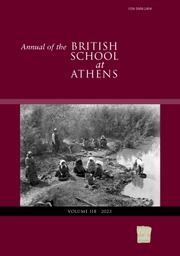No CrossRef data available.
Article contents
The Part of Pylades in Aeschylus' Choephoroe
Published online by Cambridge University Press: 11 October 2013
Extract
Such editors of Aeschylus as have time left from considering difficulties of the text to deal with larger problems of structure and presentation remark on the fact that Pylades speaks but three lines in the whole play. Verrall, for instance, who despite his many and great shortcomings as a scholar never lost sight of the essential fact that Aeschylus is a dramatist, draws attention to and attempts to justify it.
- Type
- Research Article
- Information
- Copyright
- Copyright © The Council, British School at Athens 1937
References
page 201 note 1 P. xix sq. of his edition of the Choephoroe, London 1893.
page 201 note 2 Ibid., p. xxxii.
page 203 note 1 However the tomb was represented and wherever it may have been, it is evident that Aeschylus intends the audience to suppose it out of ear-shot, perhaps even out of sight, of the palace. Contrast Soph., El., 1326, where the old attendant chides the brother and sister for talking so much and so loudly; evidently it would not be hard to overhear them. But no one in Aeschylus is at all apprehensive that the elaborate and far from silent appeals for vengeance and supernatural aid of the long kommos will attract any attention.
page 203 note 2 I do not, however, agree with E. Harrison (C.R., L 11) that any Phokisms are actually to be looked for in the text. The language is the ‘Attic’ of the stage, of course far removed from that of real life, but what Attic audience would recognise it as Phokian when the characteristic North-western retention of the primitive ā is nowhere to be found? I hold rather with Wecklein ad loc., that such realism belongs to Comedy, not Tragedy. So the Danaids, who apologise for their barbarian language (Supp., 119, 130), speak as good Greek as anyone else in the play. The audience are to imagine a Phokian accent, as in some modern Irish plays they are to imagine that the characters are talking in Erse.
page 204 note 1 Echoes in a later passage of an earlier one are common in Aeschylus and often significant. See for example, in this play, 924–1054, the threat of the avenging Erinyes and its fulfilment; 999, cf. Agam., 1115, where Orestes, already a little disordered, echoes the raving Kassandra's language; 1014, cf. 8, where he declares that he now can and does fulfil the duties towards his dead father which he then perforce neglected. It is probably of no significance that in 768 the chorus uses Aigisthos' own name (Agam., 1650) for his bodyguard. Of course such verbal self-imitations must not be overstressed, for they occur in all authors, from mere association of similar ideas with the same or like words.
page 205 note 1 


